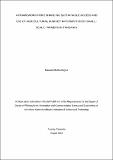| dc.description.abstract | Agriculture in African developing countries employs majorities and contributes greatly to both human development and national economies. Despite its significance, the sector is dominated by small scale farmers living in rural areas and practising subsistence farming. Among the challenges confronting farmers include poor access to markets for their farm produce and lack of market information while selling their produce. The challenges have led to low prices of produce which also leads to low investments in agriculture, low productivity due to practising traditional farming methods, poor motivation to others to invest in agriculture, some quitting agriculture for other preferred jobs, and emergence of middlemen in the agricultural supply chain. Adequate market access and market information use can help farmers make important decision (e.g. plan what crops to plant, when to plant, and when and where to sell their farm produce).
With regards to market access and use of market information, farmers in Tanzania are challenged with unreliable and underdeveloped markets, lack of market information, poor or no infrastructure (e.g. rural roads, transporting means, and electricity), illiteracy, poor knowledge on agricultural marketing, and presence of middlemen. Based on the Capability Approach and Concepts, a framework for linking farmers to markets while providing them with market information was developed. The essence is to develop their (farmers) capabilities to become active market actors. Using a case study of farmers accessing agricultural market information from the NINAYO program, information capabilities of small scale farmers was measured.
Methods employed by the study include extensive literature review, data collection through field visits and surveys, interviews and observations, and by using questionnaires. Analyses of data were done using descriptive statistics, and regression analysis. To develop a framework, identified challenges in market access and market information use were mapped into various components of Livelihood Framework and the Empowerment Framework.
Thus, to improve access to markets and enhance use of market information by farmers, different actors (public and private) need to be involved. Different resources (education, financial, cultural, social and informational) of farmers need to be improved. The overall is to ensure farmers gain and benefit from their agricultural activities, their lives and economies improve, rural lives and economies improve and the national economies, at large, improve. | en_US |

